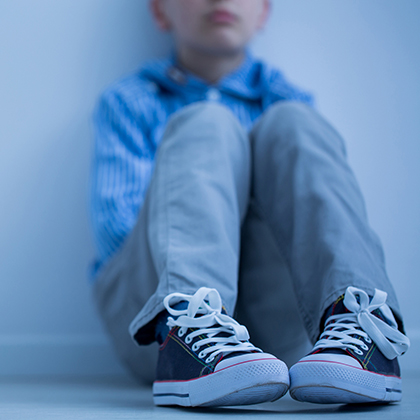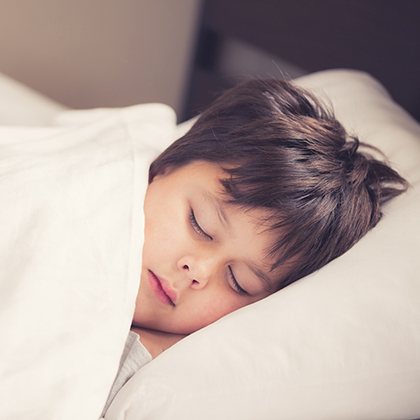
Some children seem to be brimming with self-confidence and happily take on new challenges without so much as a thought. But if your child doesn’t have a can-do attitude and lacks confidence in general, it could be because they have a problem with self-esteem.
Self-esteem is a word we hear often, but what does it mean exactly and why is it so important? It’s frequently used interchangeably with self-confidence, but the two terms – though similar – don’t mean quite the same thing.
Self-confidence is how you feel about what you do and your abilities. And while some people are often described as self-confident overall, it’s quite possible to be very self-confident about some of your abilities while at the same time having very low confidence in others. For instance, you may feel highly confident about your ability to do your job, but not at all confident about public speaking.
Self-esteem, on the other hand, is the opinion you have of yourself or how you feel about yourself. Do you see yourself in a positive light? If so, you have good self-esteem, which means it’s more likely that you see life in general more positively too. And that can help you deal with the ups and downs of everyday living, so that you bounce back when faced with difficult or challenging situations.
Having low self-esteem, meanwhile, can make you see yourself more negatively and in a more critical light, making you less likely to relish the challenges life throws at you. Having low self-esteem means you may find it difficult to recognise the good things about yourself, and you may blame yourself when things go wrong, telling yourself you’re not good enough or that you’re worthless.
It’s also possible to be self-confident and have low self-esteem at the same time.
How self-esteem develops
Self-esteem starts in very young children and develops over the years, with one study suggesting that a child’s self-esteem has already been established by the time they reach their fifth birthday (i). Babies who receive positive attention and care can start to develop good self-esteem very early on in their lives. Then as they get older and become able to do more and more things for themselves their self-esteem grows.
Learning new things at school, getting good grades and passing exams, making friends, making progress with activities they enjoy and receiving positive praise for their efforts are all things that may help boost a child’s self-esteem as they’re growing up.
What causes low self-esteem in children?
Children constantly receive messages about themselves – both positive and negative – from everyone they come into contact with, including parents, siblings and other family members, friends and teachers. However, the negative messages tend to stick with children (and adults) more than the positive ones. These negative messages – for example, ‘You’re naughty’ or ‘You’re not very bright’ – can damage a child’s self-esteem significantly.
Comparing children to other children in a negative light can also damage the view they have of themselves. This can sometimes happen in families, where one child is compared to a younger or older sibling (e.g. ‘Why can’t you get good grades at school like your sister?’). Older children and teenagers may find their self-esteem affected if they spend a lot of time using social media too, as they may compare themselves to others they see online who appear better than them in one way or another.
One survey carried out by the Royal Society for Public Health, which involved teenagers and young adults aged 16 to 24, looked at how social media platforms were affecting their health and wellbeing (ii). The results suggest that social media use is linked with increased rates of anxiety, depression and poor sleep, and that it may have a detrimental effect on young people’s body image – that is, the way they feel about how they look – particularly in young girls and women in their teens and early twenties.
Meanwhile a child can develop low self-esteem if they believe those around them see them as a nuisance, or if people aren’t interested in them and what they’re doing. Or they may suffer self-esteem set-backs if they have the type of personality that sets impossibly high standards for themselves and then fail to live up to their own – or other people’s – expectations.
Life events
While other people and their behaviours can be a major cause of low self-esteem in children, stress and difficult life events can affect them negatively too. All children are different. But some who experience one or more of the following may find their self-esteem takes a tumble:
-
Moving house
-
Serious illness
-
Bereavement
-
Separation or divorce
-
Starting a new school
-
Other problems at home or school
Why self-esteem matters
According to the NHS, low self-esteem or confidence can make you shy away from social situations, stop trying new things and to avoid things you find challenging (iii).
If a child has low self-esteem it can affect their relationships and how they perform at school and in society. They may struggle more than most to make friends, for instance, or to try sports or take part in class discussions and group projects.
Teenagers, meanwhile, are particularly susceptible to self-esteem issues because of the pressures they experience both in and out of school. For instance, there’s often a lot of pressure on teens to look a certain way and to be popular, not to mention the pressure they get from their parents to do well at their schoolwork and exams. As a result, instead of focusing on what they’re good at some teenagers may fixate on their weaknesses and their mistakes.
All of these things can have major repercussions on children as they get older. Those who feel unsure of themselves at a young age tend to have a higher risk of developing mental health problems as they grow up, such as depression, anxiety and self-harming. Indeed, there are studies that have found low self-esteem may contribute to depression (ii) as well as other mental health issues such as eating disorders (v).
And because some children with self-esteem issues may find life in general – including their career and relationships – harder to manage when they become an adult, they may also smoke and drink too much alcohol when they’re older
The good news is that helping your child develop healthy self-esteem from an early age can have a major impact on their lives, giving them a positive sense of worth and helping them in many areas, including:
-
Helping them believe in their values
-
Helping them to stand up for themselves
-
Helping them connect and interact with others
-
Giving them the mindset to make healthier choices
-
Helping them realise good things can happen
-
Giving them the courage to be their own person
-
Giving them the confidence to say ‘no’ to risky activities
-
Helping them to not allow others to treat them badly
-
Encouraging them to keep trying, even when they fail at something
-
Helping them to find the positives when they make a mistake
Signs to look out for
It’s not always simple to spot a child with a self-esteem problem. After all we all have self-esteem dips now and then. But if your child shows signs of low self-esteem all or most of the time, it shows they may be struggling.
Here are a few of the things you should look out for that could suggest they need a little more support:
-
They shy away from tasks and challenges, refusing to even try.
-
They give up at the first hurdle when they do try something new, such as a game or a task.
-
They talk about themselves in a self-deprecatory manner, constantly putting themselves down (saying things like “Nobody likes me”, “Everything’s my fault”, “I never do anything right” and so on).
-
They find it difficult to accept praise or criticism.
-
They don’t have many friends or they always want to be on their own.
-
They play down their achievements and doubt their successes.
-
They find it difficult to adapt to new situations.
-
They’re very sensitive about what other people think about them.
-
They constantly compare themselves to others.
-
They start to lose interest in activities they used to enjoy.
-
They perform less well at school.
-
They go to great lengths to avoid social situations.
-
They often seem withdrawn or depressed.
-
They lose their temper easily.
-
They start adopting negative behaviours such as missing school, experimenting with smoking or drinking, and generally behaving in a disrespectful manner.
-
They say “I can’t” a lot.
How parents can help
Whether your child has a problem with self-esteem or not, there’s lots you can do to help them feel good about themselves. Showing them lots of love and affection and giving them a safe and comfortable home environment are obviously important, but here are a few other things that may help:
Be a good role model
If you have good self-esteem, your child will naturally want to have good self-esteem too. For instance, try to be open to new things and challenges, do things as well as you can, and try to bounce back from set-backs instead of being ground down by them.
Praise them often
Giving your child praise shows them you’re proud of them. But try to avoid overdoing it, and don’t just praise your child for getting good results. Instead, offer genuine praise when they make an effort and for any progress they’re making. This can help children learn the value of working towards goals and trying, even when they don’t succeed.
Avoid harsh criticism
Try not to criticise your child in a negative way. If you need to correct them be patient and – where possible – show them what they should do instead of simply complaining that they’re doing it wrong. Even when a child does something wrong there’s usually something positive you can say – so emphasise the positives rather than the negatives.
Be a good listener
Show real interest in what your child is doing or saying and give them plenty of attention when they talk about what they’re doing, their interests or their problems. Being a good listener will show them you care about them, which is a basic requirement for healthy self-esteem.
Focus on their strengths
All children have strengths and weaknesses, but instead of focusing on their weak spots try to pay attention to what they do well and enjoy. Being good at something can help children feel more capable. Also try to make sure you give them whatever you can to help develop their strengths, including your encouragement. At the same time try not to criticise them for the things they don’t do well – remember that it’s natural for everyone to be good at some things and not so good at others.
Help them learn
If your child makes a mistake help them to find out how they can learn from it. Encourage them to think calmly about their mistakes and discuss what they could do differently the next time.
Get them involved
Helping others and getting involved in good deeds can make children feel more valued, so try to encourage your child to help out at home, for instance, or to do favours for friends and neighbours. This can help them recognise that what they do matters to other people.
Teach them about expectations
Some children have personalities that lead them to set impossibly high expectations for themselves. If this is the case with your child, try to show them how to aim for more realistic goals, so that their self-esteem doesn’t take a blow when they don’t meet expectations that are too high. But at the same time try to avoid establishing expectations that are too low, as these can lead to a lack of a sense of accomplishment.
References:
-
Cvencek . D, Greenwald. AG, Meltzoff. AN, . Implicit measures for preschool children confirm self-esteem’s role in maintaining a balanced identity. J of Exp Soc Psych. 2016 Jan;52:50-57. Available online: https://www.sciencedirect.com/science/article/abs/pii/S0022103115001250
-
Royal Society for Public Health. #StatusOfMind. Available online: https://www.rsph.org.uk/uploads/assets/uploaded/d125b27c-0b62-41c5-a2c0155a8887cd01.pdf
-
Available online: https://www.nhs.uk/conditions/stress-anxiety-depression/raising-low-self-esteem
-
Hilbert. The Role of Self-Esteem in Depression: A Longitudinal Study. Behavioural and Cognitive Psychotherap. Volume 47, Issue 2 (March 2019). pp 244-250. Available online: https://www.cambridge.org/core/journals/behavioural-and-cognitive-psychotherapy/article/role-of-selfesteem-in-depression-a-longitudinal-study/5DD05205611975C8D268A8CBAC43D73D
-
Park. K., Tang. T.C. The Long-term Effects of Self-Esteem on Depression: The Roles of Alcohol and Substance Uses during Young Adulthood. Sociol Q. (M2017). 58(3): 429–446. Available online: https://www.ncbi.nlm.nih.gov/pmc/articles/PMC5602593
-
Mora. F., et al. The impact of self-esteem on eating disorders. European Psychiatry. Vol 41, Supplement, (April 2017). Page 5558. Available online: https://www.sciencedirect.com/science/article/pii/S0924933817308179
Related Posts
Disclaimer: The information presented by Nature's Best is for informational purposes only. It is based on scientific studies (human, animal, or in vitro), clinical experience, or traditional usage as cited in each article. The results reported may not necessarily occur in all individuals. Self-treatment is not recommended for life-threatening conditions that require medical treatment under a doctor's care. For many of the conditions discussed, treatment with prescription or over the counter medication is also available. Consult your doctor, practitioner, and/or pharmacist for any health problem and before using any supplements or before making any changes in prescribed medications.

Christine
Christine Morgan has been a freelance health and wellbeing journalist for almost 20 years, having written for numerous publications including the Daily Mirror, S Magazine, Top Sante, Healthy, Woman & Home, Zest, Allergy, Healthy Times and Pregnancy & Birth; she has also edited several titles such as Women’ Health, Shine’s Real Health & Beauty and All About Health.
View More



